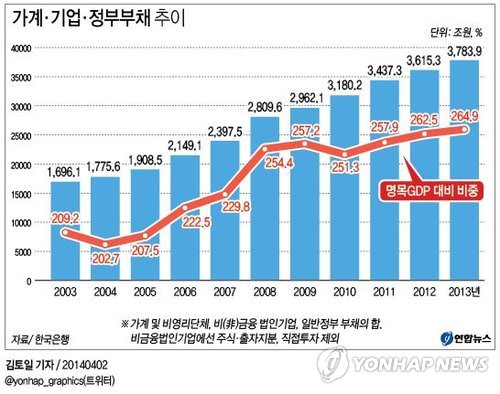In order for innovation to play a proper role in a society, stable macroeconomic conditions are needed. Mounting debts lead to shaky consumer sector. Korea is not succeeding in making the transition from economic miracle to normal development.
From Yonhap:
Combined debt held by households, companies and the government was almost three times larger than the size of the South Korean economy last year, data showed Tuesday.
As of end-2013, debts held by economic agents amounted to 3,783,9 trillion won (US$3.58 trillion), accounting for 264.9 percent against the nominal gross domestic product (GDP). It compared with 262.5 percent tallied in 2012.
http://english.yonhapnews.co.kr/business/2014/04/02/0503000000AEN20140402002900320.html
연합뉴스로부터:
새로운 기준 적용으로 국내총생산(GDP)이 많이 늘어났음에도 한국의 가계·기업·정부의 빚은 전체 경제 규모의 3배에 육박하는 것으로 나타났다.
2004년 202.7%에서 2006년 222.5%, 2007년 229.8% 등으로 상승하더니 글로벌 금융위기를 맞은 2008년 254.4%로 훌쩍 뛰었고 2012년는 260%선으로 한단계 더 높아졌다.
정부, 기업, 가계를 가리지 않고 경제 주체들의 빚이 부가가치를 만들어내는 속도보다 더 빠르게 불어났기 때문이다.
우선 작년말 가계 및 비영리 단체의 부채는 1천223조1천억원으로 그 10년 전인 2003년의 2.3배로 늘었다.
비금융법인(민간기업+공기업·주식 및 출자지분, 직접투자 제외) 부채도 206조4천억원으로, 10년 전의 2.2배로 불었다.
특히, 정부(중앙+지방)의 부채는 496조6천억원에 달해 3.4배로 늘었다.
이 기간 새 기준 명목 GDP는 810조9천억원에서 1천428조3천억원으로 76.1% 증가하는 데 그쳤다.
http://www.yonhapnews.co.kr/economy/2014/03/31/0301000000AKR20140331216600002.HTML?template=5565

No comments:
Post a Comment